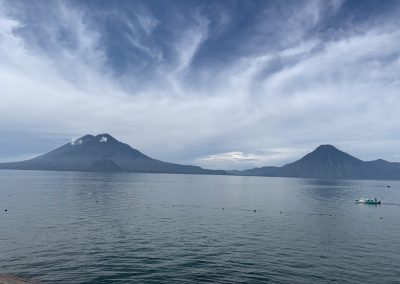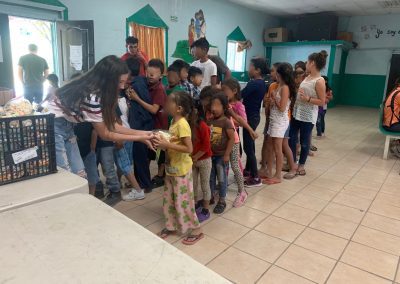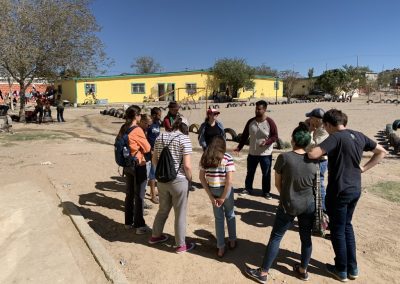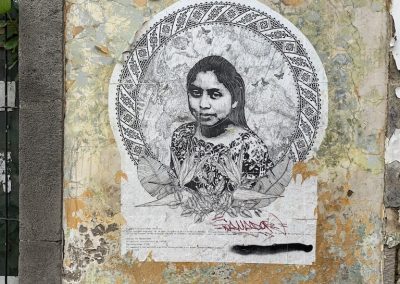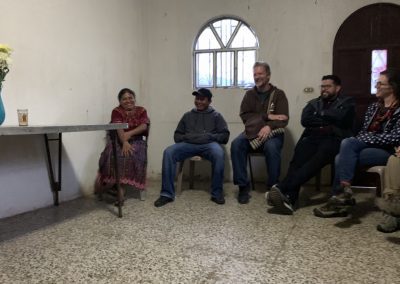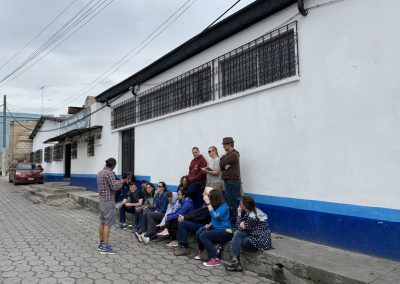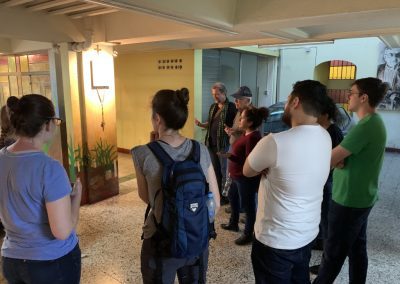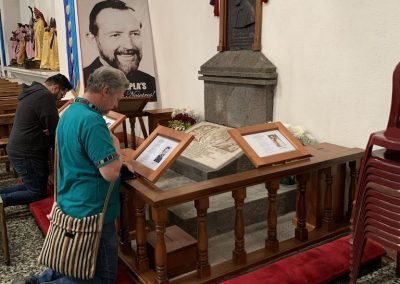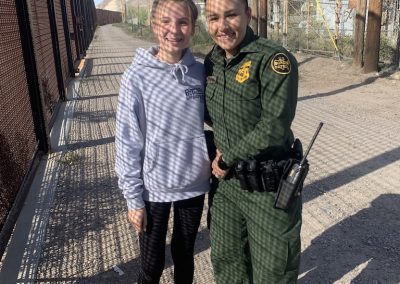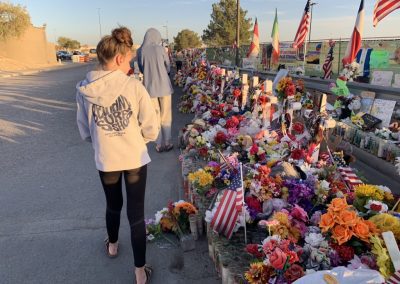Coracle’s first pilgrimage to understand immigration issues and the forces that are driving tens of thousands of people northwards from Central America is now done. We flew from Washington DC to Guatemala, and then on through Mexico to Juarez and then El Paso, Texas–the Borderlands–then back to DC. We were well hosted and well led by Nate Bacon of InnerChange—Central America and Sami Di Pasquale of Abara Frontiers. These are ministries worthy of prayer and financial support.
It is an understatement to say this trip was special. I knew it would be powerful, I just had no idea how much. I knew it would have its sacred moments, I just had no idea the whole thing would be sacred. I’m glad one of our fellow pilgrims was able to write about it here a day or two after returning home.
Honestly, I hadn’t planned on writing much about this trip, preferring to leave it to others this time. But upon reflection, write I must. Narrative is impossible, there were too many stories from too many places, too many statistics, too many amazing people, too many folks in whose presence I barely felt worthy enough to stand.
So, at the risk of incomplete stories and tales that cannot remotely capture the power of this experience, I’ll offer some vignettes, and then some insights, convictions, maybe some challenges, and then what’s next.
In the spirit of pilgrimage, journey with us, in chronological order, though not remotely covering everything…
Guatemala
- We toured the largest cemetery in Guatemala City, as a helpful backdrop to learn about what has been termed the “collective woundedness” of Guatemala. We learned about five collective wounds: the wound of social and economic disparity, the racial wound, the religious wound, the wounds caused by US intrusion for the last 70 years, and the wounds still holding over and deeply embedded from Spanish colonization over 500 years ago. We didn’t get to hear about a sixth: violence against women.
- We spent time in the Guatemala’s ‘garbage city’, built over the largest trash dump in Central America, and spent time with Fito and Nancy, who grew up in this slum and chose to come back there to live incarnationally in order to love God and serve people. In the prior 7 days, two of the young people they work with had been killed, one shot and one stabbed. We prayed there, and anointed their house with oil.
- We visited the martyrdom site of Bishop Juan Gerardi, who in 1998 published a report identifying the victims and perpetrators of violence during the 36 year Guatemalan civil war (1960-1996) as part of a church-led Truth and Reconciliation committee. Two days after the report was published, the Bishop was beaten to death beyond recognition in the church garage. There’s a very powerful mural in that garage, titled simply and starkly, “Eucharist of the Martyrs”. We prayed where his body laid.
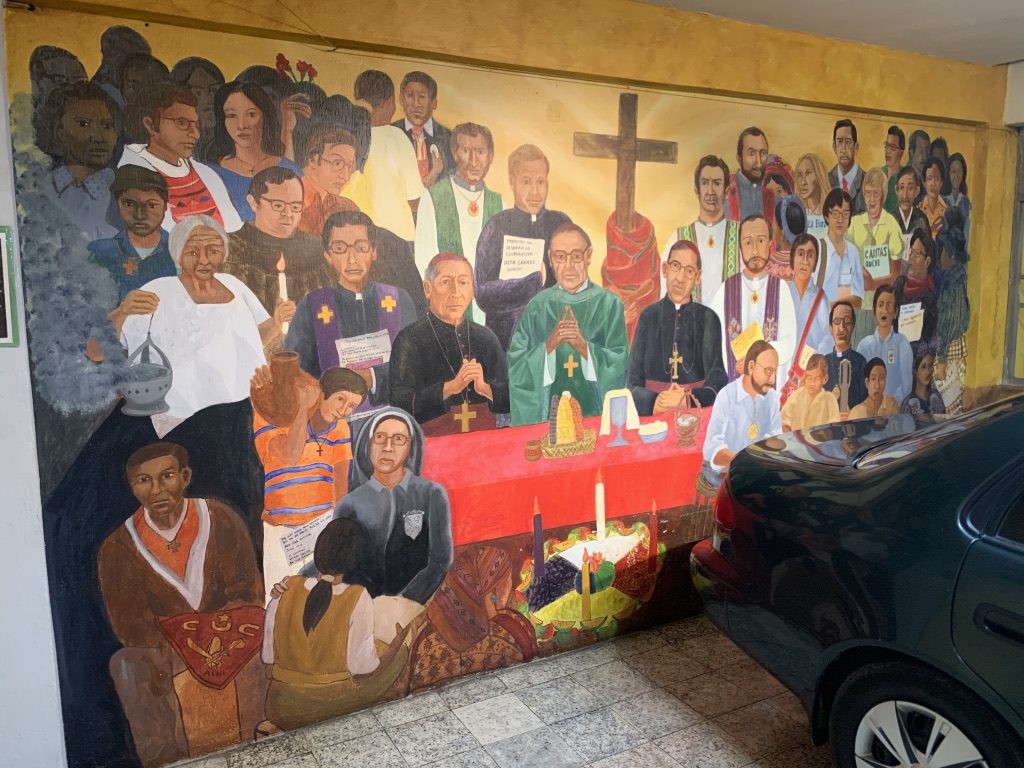
- We went to the Forensic Anthropological Foundation of Guatemala, which locates and identifies the remains of as many of the 200,000 victims of massacres and 40,000 disappeared persons as possible. Their workers reconstruct the skeletons so that the remains can be positively identified and reburied with dignity for the comfort of the families, and so that there is the possibility of prosecution for criminal acts for those responsible for the killing. We stood with the skeletons laid out inches away on tables, and the ones we saw were of people–each one an image-bearer and beloved of God–killed mostly by gunshots to the head. There were countless boxes around the place, each one holding bones from an individual waiting to be identified. We prayed silently there.
- We met with three powerful women (Catholic sisters) who have given their lives for justice and healing in Guatemala, in community with others and at the risk of their own lives. One of the names of the groups was “Centinales”–the Sentinels. We prayed there.
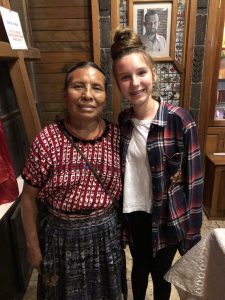
- We went to Santiago Atitlan to visit the martyrdom site of Fr. Stanley Rother, an American who who was killed by a death squad in1981 because he served the poor, which got him targeted as a Communist. He was not, he was simply a Christian. He is called “An Ordinary Martyr”. In the room in which Stanley died–now a chapel–we met two people who served with him, Juan and Chona. Chona cleaned up his blood that night and hadn’t been back in the room for almost 40 years until she met with us that day. Both Juan and Chona were protected from death by God over years as they risked their lives to serve and save others. We had gone to visit the place of a man who lived like Christ; we met two people in whom Christ is still living. We prayed for them; they prayed for us. There was no need to anoint the floor with oil. It had been anointed with blood.
- We went to Guatemala’s second largest city, Quetzaltenango (Xela in the Mayan language, it’s historic name), and met with the InnerChange team there.
- We heard the testimony of a now-grown man, once a ‘shoe-shine’ kid, who found freedom and a much better life through God.
- We heard first-hand stories of migrants who went north to come make money for their family, and came back, which was always the plan. The story of the migrant route was harrowing and awful. Who would do that if they didn’t feel they were forced to?
- We visited the detention center where deported unaccompanied minors are held until their families pick them up. We heard them playing inside, like kids do. We prayed there, and anointed the building with oil.
- We prayed in the oldest church in Central America, built in 1524 as soon as the town was conquered and many Mayans had been killed to make way for the Spanish. InnerChange and Coracle committed to partnership there, for the sake of justice, reconciliation, the poor, and church unity.
- Near Xela we visited with the family of Claudia Patricia Gomez Gonzalez. Claudia was 20 years old with a degree in accounting, trying to get to Alexandria, Virginia when she was fatally shot in the head by a border patrol agent 18 months ago. Her case has not remotely been resolved, the details are still hidden even now; her parents still grieve, and her father is still (understandably) angry. We sat in the same room with Claudia’s mom and dad where her body had been laid out for her funeral. We prayed for them there, and her mom prayed for us, that we would “make it home safely”.
- All along the way we drank deeply of the beauty that is Guatemala, be it on Lake Atitlan, in Sumpango, in Xela, or in Antigua, or driving in a shared bus through the gorgeous countryside. We received often the good gift of great food. We drank deeply of the fellowship with fellow pilgrims.
In Transit
- It took a day to get from Guatemala City to El Paso, because we flew first to Juarez, Mexico, and the border crossing alone took two hours of being in line. The next day it was two and a half hours. The waiting was an important experience.
El Paso and Juarez
- We visited the site where the first European set foot in the Western United States and began the Spanish colonization of the western part of what is now our country. We prayed there, and anointed that ground with oil.
- We went to a small section of the border wall in New Mexico, and got our hearts broken by the kids on the other side–shaking hands through steel, the difference being both 12 inches and a million miles. We prayed there, and had Eucharist, and poured out the blood of Christ on both sides of that ugly wall, proclaiming that God’s kingdom has come and will come, where there are no borders.
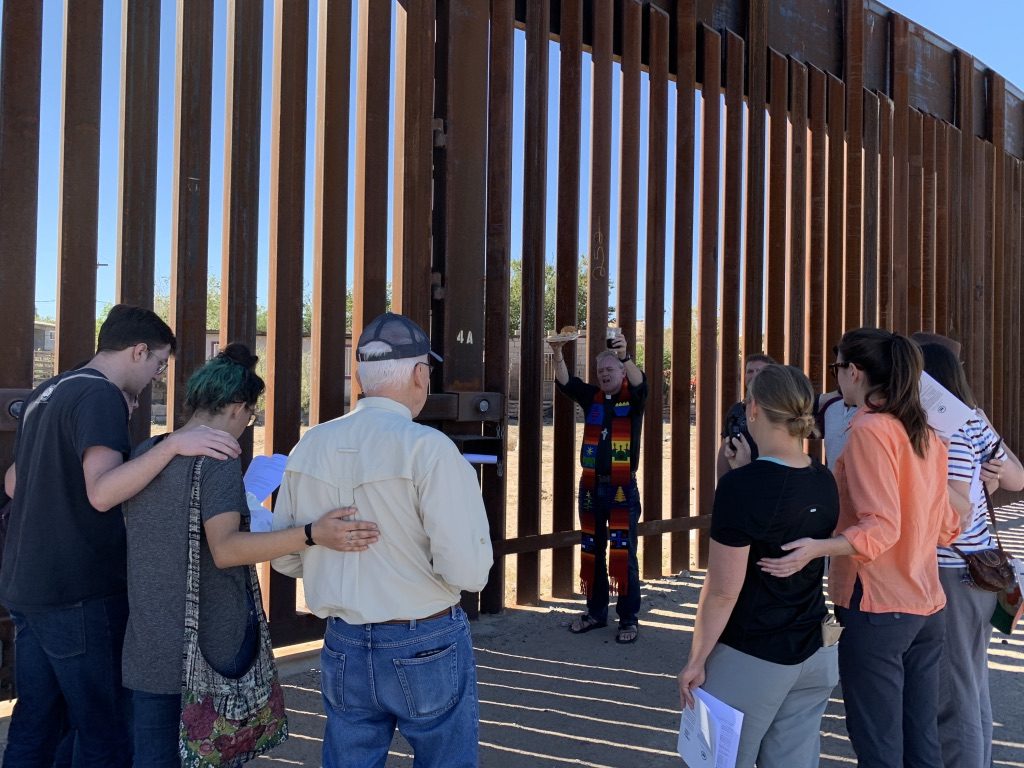
- We crossed over into Mexico again, and went to a migrant shelter, where we met people fleeing Guatemala, Honduras, and El Salvador and heard their painful stories, with a common denominator of people running away from the threat of death. There were many families, and many children. We prayed there, and wept. My daughter Iona passed out care packages to the kids, a very small thing but done with love, and very meaningful to her at least.
- We learned. We heard excellent lectures on an overview of current border realities, Immigration Law 101 (it’s very complex and extremely difficult to get into the US legally), and the theology of migration (about every character in the Bible was a migrant at some point read through that lens). Abara Frontiers does an excellent job. We also learned more at the Hope Border Institute, and heard for the first time the phrases “border theology” and “border spirituality”.
- We met at the high, double-meshed steel fence with a Border Patrol agent, who was so good and so strong. She told us about how it all works, and about the challenges that she and her colleagues face, and their attempts to do a very difficult job with compassion and as humanely as possible. We prayed for her.
- We visited the huge memorial at the Walmart in El Paso to the 22 men and women who lost their lives in a racially targeted shooting just three months ago. The shooter had come specifically to kill Hispanics, and he did. We circled up, we wept, we collapsed on our knees to the ground, we groaned, and led by the Spirit, we prayed there.
- And then we flew back to Washington–ironically to Dulles Airport–each of us touched so deeply, even formed by our pilgrimage, perhaps even transformed. Though this recounting is long, I didn’t even tell all the stories.
Several years ago, on a flight back from Nepal, I wrote a flood of thoughts that would become the piece, “After These Many Years and So Many Miles…This Is What I Know”. It was a distillation of some key observations and convictions that I’ve arrived at after tens of thousands of miles of world travel to dozens and dozens of countries over 25 years. Writing that from Nepal, it’s got an Asian spin to it. Read it first to get a context for what follows.
I wrote a lesser flood of thoughts on the flight from Houston to Washington, so now you can add what follows to that first list. I’ll start with one from the first flood because it is so resonant when I think about those kids standing on the other side of that border wall, whom I could touch but could not hug.
-
- Nobody chooses where they are born. This has a lot of implications.
- Related, as Bono sang it, “Where you live should not decide whether you live or whether you die.”
- Every human being matters, each and every individual man, woman, and child. Those whose value is less recognized need more attention precisely because their value is less recognized.
- There is a lot of Central American blood on American hands, specifically on those of the United States. We created and sustained much of the death and violence in Central America; we significantly helped create the problems; and therefore, we are obligated to be a significant part of the repair. This probably includes hospitality.
- Greed is at the root of most evil things, and for the last 500-600 years a sense of racial superiority (and corresponding inferiority) has trailed closely behind deep greed, in fact usually right behind it and in lock step.
- It’s not unusual for the most broken places to actually be sacred places. Sacred places and broken places, God is present in them all.
- Indigenous people generally get screwed. Consider the Native Americans, Africans, Aborigines, Mayans, Palestinians, and a bunch of others. Something sinister is underneath that pattern.
- We are all one family. Period. Full stop.
- Every person I see is a brother or sister, even those I dislike and disagree with. Especially in those cases, I must remember that every person I see is a brother or sister.
- America loves democracy, except in countries where we have some self-interest and some one is elected who we perceive as a threat.
- Human history is both stunningly beautiful and persistently painful. As Bruce Cockburn sang it, “Little round planet in a big universe // Sometimes it looks blessed, sometimes it looks cursed // Depends on what you look at, obviously // Even more it depends on the way that you see.”
- Mothers and fathers will go to extraordinary lengths to care for, protect, and provide for their children. It’s just a matter of form, and some forms are more desperate than others. The primal impulse is the same.
- Empathy is a critical capacity.
- White supremacy is ubiquitous, and drives many things. Sometimes it is explicit, most of the time it is implicit. The former builds systems, the latter keeps those systems in place and operating. All the time it is very powerful, and effective for a while.
- Jesus Christ is the hope of the world. He chooses to use his people in whom he lives.
- It is the responsibility and even obligation for a citizen of the United States to steward that privilege and power, which for most of us was underserved, not our choice, and simple Providence.
- The materially poor have many spiritual riches to offer the materially fine, and even more so the rich.
- I am an American. So are Canadians, Mexicans, Central Americans, and South Americans. We are all Americans by virtue of being resident in the Western Hemisphere. It just so happens that I’m also a citizen of the United States. North, South, and Central, we are all Americans.
- Prayer does stuff.
- The world needs more peacemakers, Shalom creators, flourishing bringers.
- Jesus really launched something. It’ll be good when he finishes it.
- Maranatha! Come Lord Jesus!
As I wrote here, Christian community engaging a most hurting world around the world has been Tara’s and my heart since long before we met. Intentional and incarnational Christian community engaging brokenness has been and remains deep for us. So since Coracle began in 2012, I’ve hoped for and prayed for a partner internationally who is doing good work with shared values that we might be in reciprocal relationship with. I’ve sensed it would need to be close enough geographically so that those relationships could actually be cultivated and shared ministry be real, and close enough for families to be able to participate, reciprocally.
Central America is close enough, and this trip to Guatemala was in part to explore all this, and also to understand the painful conditions in that part of the world that is driving migration northwards, as well as understand realities at our southern border in order to try to formulate a Christian response to all of it. A first attempt to articulate that is HERE.
As for our hopes to discern partnership, these were satisfied above and beyond what we could have hoped or imagined. I’m not exaggerating when I say that the Holy Spirit sparked the relationship between Nate Bacon and myself earlier this year, and it seems to be the case too for the relationship between InnerChange—Central America and Coracle. It has begun, and we trust it will be deep for many for years to come.
The way forward isn’t entirely clear, but that we are to find a way forward is very clear, and we’re already getting to work on that. Stay tuned, and join us as we join whatever God is doing in all this. It is clear that he’s doing much and inviting us into more.
On the journey,

“SOUNDINGS” posts are aimed at considering together topics that are important for our society, for the Church, and for our own spiritual journeys. To ‘take a sounding’ is a nautical term about using depth to determine where you are and where you’re going. These writings are designed to do just that. Please share this post with friends you think might appreciate it. If you would like to get SOUNDINGS posts from me sent directly to your inbox, click here.

